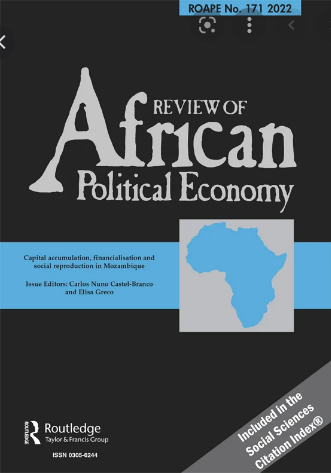Mozambique – neither miracle nor mirage

Title: Mozambique – neither miracle nor mirage
Author(s): Carlos Nuno Castel-Branco and Elisa Greco
Publication Date: March 2022
Publisher: Review of African Political Economy (a member of the Taylor & Francis Publishers)
Quotation: Castel-Branco, Carlos Nuno; and Elisa Greco. 2022. “Mozambique – neither miracle nor mirage”. Review of African Political Economy, VOL. 49, NO. 171, 1-10, https://doi.org/10.1080/03056244.2022.2047297
Abstract: https://www.repository.utl.pt/handle/10400.5/23910 Editorial da edição especial da Review of African Political Economy (RoAPE) com o tema genério “Capital accumulation, financialisation and social reproduction in Mozambique”, volume 49, númer 171, de Março de 2022, co-editada por Carlos Nuno Castel-Branco e Elisa Greco.
Identifier: https://doi.org/10.1080/03056244.2022.2047297
Category: Other Publications
Mozambique – neither miracle nor mirage by Carlos Nuno Castel-Branco and Elisa Greco explores how over two decades, in the 1990s and 2000s, international organisations, development cooperation agencies, financial institutions and the media often described the Mozambican economic, social and political trajectory as a ‘miracle’. Hailed as the ‘rising star’ of Africa in 2005 by the New York Times (2005) and by The Economist, the country has long been praised by neoliberal institutions as a model reformer, open and attractive to foreign direct investment (FDI), and for its high rates of economic growth, soaring primary commodity exports and one-digit inflation. While a milder version of this image of a Mozambican ‘miracle’ persisted throughout the 2010s, it started to clash with the reality of worsening inequality, poverty and crisis in social reproduction, as well as the emergence of the first clear signs of a debt crisis yet to come. In the main cities, violent riots triggered by rising costs of basic wage goods and services, over and above average inflation, erupted in February 2008 and again in September 2010. In September 2010, The Economist described these riots as the revolt of the ‘angry poor’, which did not deter international financial think tanks and media from continuing to emphasise the Mozambican ‘miracle’ (The Economist 2010). The country saw the contradiction of worsening poverty, high aid dependency and inequality at the same time as it was being described by the Financial Times as ‘at the centre of unprecedented international investor attention’ (Financial Times 2012, 2010). In May 2014, in her speech to the Africa Rising conference held in Maputo, IMF Managing Director Christine Lagarde highlighted Mozambique’s impressive performance with respect to economic growth as being the result of decades of institution building and sound macroeconomic management, which justified the IMF’s formal permission for Mozambique to obtain new loans on non-concessional terms (Orre and Rønning 2017). Two years later, in 2016, The Economist highlighted the country’s soaring sovereign debt in a context of increasing FDI and aid inflows, and the creditworthiness of the Mozambican economy was downgraded by credit rating agencies from stable average, where it had been from 2003 to 2015, to severe risk of default (Castel-Branco 2020). How can we make sense of this somehow contradictory information? Is Mozambique a ‘miracle’ or a ‘mirage’?
Abstract:
Editorial of the special issue of the Review of African Political Economy (RoAPE), titled “Capital accumulation, financialisation and social reproduction in Mozambique”, volume 49, number 171, March 2022.
Quotation:
Castel-Branco, Carlos Nuno; and Elisa Greco. 2022. “Mozambique – neither miracle nor mirage”. Review of African Political Economy, VOL. 49, NO. 171, 1-10, https://doi.org/10.1080/03056244.2022.2047297
Access the article here,





